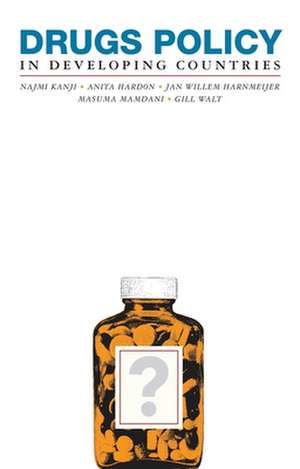Drugs Policy in Developing Countries
Autor Najmi Kanji, Anita Hardon, Gill Walten Limba Engleză Paperback – 31 aug 1992
Preț: 144.04 lei
Preț vechi: 167.85 lei
-14% Nou
Puncte Express: 216
Preț estimativ în valută:
27.57€ • 29.93$ • 23.15£
27.57€ • 29.93$ • 23.15£
Carte tipărită la comandă
Livrare economică 23 aprilie-07 mai
Preluare comenzi: 021 569.72.76
Specificații
ISBN-13: 9781856490603
ISBN-10: 1856490602
Pagini: 152
Dimensiuni: 138 x 216 x 14 mm
Greutate: 0.2 kg
Editura: Bloomsbury Publishing
Colecția Zed Books
Locul publicării:London, United Kingdom
ISBN-10: 1856490602
Pagini: 152
Dimensiuni: 138 x 216 x 14 mm
Greutate: 0.2 kg
Editura: Bloomsbury Publishing
Colecția Zed Books
Locul publicării:London, United Kingdom
Notă biografică
Najmi
Kanji
is
a
research
fellow
in
the
Health
Policy
Unit
at
the
London
School
of
Hygiene
&
Tropical
Medicine.Anita
Hardon
is
a
medical
biologist
in
the
Medical
Anthropology
Unit
of
the
University
of
Amsterdam.Jan
Willem
Harnmeijer
works
in
the
Primary
Health
Care
Unit
at
the
Royal
Tropical
Institute
in
Amsterdam.Masuma
Mamdani
is
an
epidemiologist
and
research
fellow
at
the
London
School
of
Hygiene
&
Tropical
Medicine.Gill
Walt
is
a
senior
lecturer
and
head
of
the
Health
Policy
Unit
at
the
London
School
of
Hygiene
&
Tropical
Medicine
Cuprins
Tables
and
Figures
Contributors
Foreword
and
Acknowledgements
Acronyms
and
Abbreviations
1.
Early
Initiatives
in
Essential
Drugs
Policy
-
Masuma
Mamdani
2.
Formulating
an
Essential
Drugs
Policy:
WHO's
Role
-
Gill
Walt
and
Jan
Willem
Harnmeijer
3.
Consumers
versus
Producers:
Power
Play
Behind
the
Scenes
-
Anita
Hardon
4.
Action
at
Country
Level:
The
International
and
National
Influences
-
Najmi
Kanji
5.
What
Has
Been
Achieved
and
Where
are
We
Now?
-
Najmi
Kanji
and
Anita
Hardon
6.
New
Horizons
in
the
1990s
-
Anita
Hardon
and
Najmi
Kanji
Appendix
Index
Recenzii
This
book
comes
as
a
welcome
reminder
of
the
many
efforts
to
develop
policies
for
a
more
rational
use
of
medecines.
It
provides
a
clear
outline
of
some
of
the
possible
strategies
to
achieve
change.
Anyone who wants to understand the limitations and constraints of developing and executing a global policy to improve health in developing countries will find this book essential reading.
The WHO has succeeded in making "essential drugs" a respected concept. This book documents this crucial step in the improvement of the supply of medicines for people in the South.
Anyone who wants to understand the limitations and constraints of developing and executing a global policy to improve health in developing countries will find this book essential reading.
The WHO has succeeded in making "essential drugs" a respected concept. This book documents this crucial step in the improvement of the supply of medicines for people in the South.
